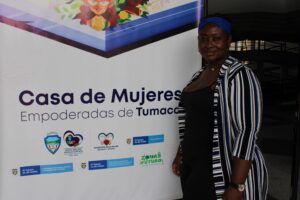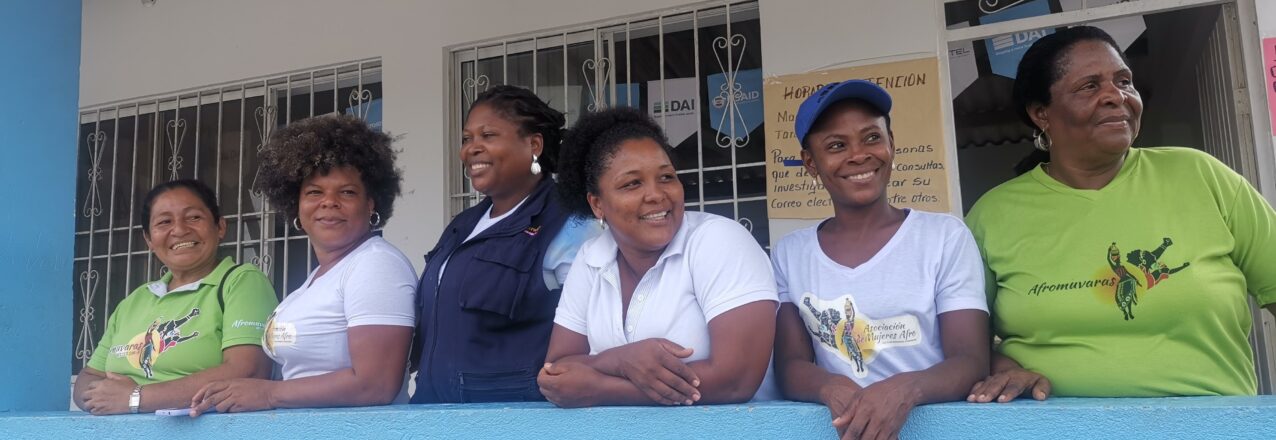Secure land rights for women are a crucial part of a USAID gender responsive strategy to strengthen land tenure, and is making an impact on promoting gender equality and protecting one’s patrimony.
Tumaco, whose population is overwhelmingly Afro-Colombian, is one of Colombia’s most dangerous areas with high levels of gender-based violence (GBV). Due to a complex web of narco mafia groups in its territory and deep-seated, toxic gender norms, Tumaco is often the municipality with the highest number of crimes against sexual integrity, many of which target young women, according to Colombia’s Victims’ Registry.
Before the onset of the pandemic, GBV—including crimes of rape and sexual abuse—was on the rise in the department of Nariño, where Tumaco is located. And then in 2020 the number of cases dropped sharply, but so did the government services to assist victims.
In 2021, the number of GBV cases in Nariño again increased by 51% compared to 2020, reaching more than 2,000 cases in one year, according to Colombian human rights advocate, Fundapaz. Tumaco registered 260 cases, or 13% of the total.
The Secretary of Women’s Affairs was created in January 2021 to take gender-based violence head on, and represents a bold step put forward by Tumaco’s first woman mayor. Patricia Castro’s job as the Secretary leader is to move women’s initiatives into the forefront.

In reality, the Secretary is helping to do the work of the Mesa de la Mujer, or Women’s Committee, which is a Tumaco-based victim’s advocate group that has worked over 10 years to raise awareness around gender equality and promote Afro-Colombian culture.
Gender violence in the context of an ongoing conflict causes widespread damage to women in a number of ways. Fear and intimidation reduce access to government services, including education and healthcare, and chronic violence weakens family relationships, disconnecting people from their cultural traditions.
GBV is also used as a tool for displacement and disproportionately affects Afro-Colombian and indigenous communities. In Colombia, an estimated 40% of women have experienced some form of gender-based violence. Since the 2016 Peace Accords, thousands of rural and urban families in Tumaco have been forced to leave their homes. Studies show that displaced women are at higher risks of abuse by their partners, and the risk for violence is compounded by the inability to escape situations of displacement.
Secure land rights for women are a crucial part of a gender responsive strategy to strengthen land tenure, and can have an outstanding impact on promoting gender equality and protecting one’s patrimony. When women have access to land and property, studies show they are more likely to earn higher incomes, enjoy increased decision-making power, and feel more protected in marital conflicts.
Land Rights are Women’s Rights
In Tumaco, the USAID Land for Prosperity Activity works closely with the municipal government to streamline gender equality and social inclusion in local land policies and activities. The USAID-supported Municipal Land Office developed an articulated gender and land titling strategy to target women-headed households in urban settings. Every month, small teams of land experts visit neighborhoods around Tumaco to explain the benefits of land titling and the rights of the women who live there.
“Thanks to USAID, housing is one of the main pillars of the Secretary of Women’s Affairs’ mandate.” – Patricia Castro, Tumaco’s Women’s Affairs Secretary
Since 2020, the Tumaco Municipal Land Office has delivered 137 land titles. Of the total, approximately 75%, or 101 land titles, are either women-headed households or joint-titled with a spouse.
“We are motivating our women to participate in land formalization workshops that are visiting their neighborhoods. Many women have the same questions about what happens if they separate from their husbands. The best way to share this information is through the workshops,” explains Patricia Castro, the Women’s Affairs Secretary.
Over the last two years, dozens of municipalities throughout Colombia have adopted effective strategies, such as Municipal Land Offices, that advance gender equality and social inclusion. In matters related to land formalization and restitution, USAID and local leaders are implementing training for staff, sub-contractors, and residents.
USAID-supported municipal land offices across Colombia have delivered approximately 800 land titles since 2020, and over 600 of those land titles are in the name of women-headed households or joint titles.
Adapted from the Land for Prosperity Exposure site.


